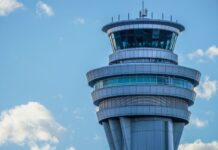What effects could the government shutdown have on meetings and events? The Exhibition and Conferences Alliance’s Tommy Goodwin explains the potential fallout for the industry.
The shutdown of the U.S. government at midnight on September 30 may not seem like as big a deal as it may have the first time it happened in recent history — this is, after all, the fourth major shutdown since 1996, the most recent being a 34-day shutdown in 2018 into 2019. But with federal lawmakers on both sides firmly entrenched and the Senate continuing to fail to pass stopgap funding proposals offered by Democrats and Republicans, it may end up going on long enough to have longer lasting effects than previous shutdowns. And several of those effects will likely hit the meetings and events industry harder than most.
Prevue recently sat down with Tommy Goodwin, Vice President of the Exhibitions & Conferences Alliance (ECA), the advocacy association for the business events industry, to learn more about what to expect as the shutdown continues.
Prevue: What are some of the immediate effects of the government shutdown that directly impact the meetings and events industry?

Goodwin: The government shutdown really affects the industry in two ways. The most urgent and pressing of which relates to travel. The good news is that air traffic controllers and TSA agents are considered to be essential workers, so they have to continue to go to work. However, they aren’t getting paid for their work during the shutdown. If this shutdown follows the usual pattern, it will take about seven days for before we start to see things tearing at the seams — as happened yesterday in Nashville when they had to restrict flights in and out of BNA due to a lack of air traffic controllers [editor’s note: Reuters is reporting there now have been more than 3,000 flight delays nationwide as staffing shortages grow]. There already was a shortage of air traffic controllers, so this just makes the situation all the more pressing and it all the more urgent to get this resolved as quickly as possible. If you have an event going on now or in the near future, with people having connecting flights, you run the risk of having no-shows and exhibitors not making it on time. It really does become an issue.
Prevue: What’s the second main way it affects the industry?
Goodwin: The Department of Commerce’s Trade Event Partnership Program (TEPP), offered through the U.S. Commercial Service, part of the International Trade Administration, helps bring international buyers to U.S. events, particularly larger events, to stimulate growth and exports. This is particularly valuable for the small businesses at these shows. The TEPP is on pause right now. So if you have a show that’s running right now and you had an international delegation that’s coming over that was being shepherded by someone from the Department of Commerce, that person’s not there to provide that service. Even once the shutdown ends, there will be a backlog to work through, so there likely will be lingering after-effects.
Those are the two areas that at this point we’re seeing the most pain from.
Prevue: I know the visa process has been on ECA’s radar screen for a while now. Does the shutdown have any impact on that?
Goodwin: Visa processing by the State Department is a fee-based service, which means that in most years, the Department of State does not get an allocation from Congress to do visa processing and passport processing — the fees they collect from those services fund services going forward. Right now, they’re processing visitor visas normally. If the shutdown goes on for an extended period of time and those fees start to run low or if staffing at embassies and consulates begins to wane because they’re not being paid and so not coming to work, there is a risk that consulates around the world may provide emergency services only. So they may have to reschedule visa interviews, which depending on where you are in the world, could take anywhere from a week to a year. So we’re keeping an eye on that as a potential lingering factor.
Prevue: Do you have any sense of when the shutdown may come to an end?
Goodwin: No, but most D.C. insiders say to keep an eye out for Monday, Oct. 13. Remember that the last shutdown was only partial — Congress had actually gotten the Department of Defense appropriations done at that point. The miliary is due to be paid on Oct. 15, and it takes a couple of days to process. If there’s nothing by the 13th, that’s about 1.3 million active-duty military people who are going to miss a paycheck. That’s usually the third rail of a government shutdown — if bureaucrats don’t get paid and the national parks aren’t cleaned up for a while, people can live with that. But people care a lot about paying the military, so maybe that will bring both sides to the table? We just have to wait and see how this plays out.
You May Also Be Interested In…
Federal Shutdown Triggers Flight Delays
Maritz Releases Special Industry Trends Report for IMEX
DC is Open: Campaign Aims to Draw Visitors During Shutdown












